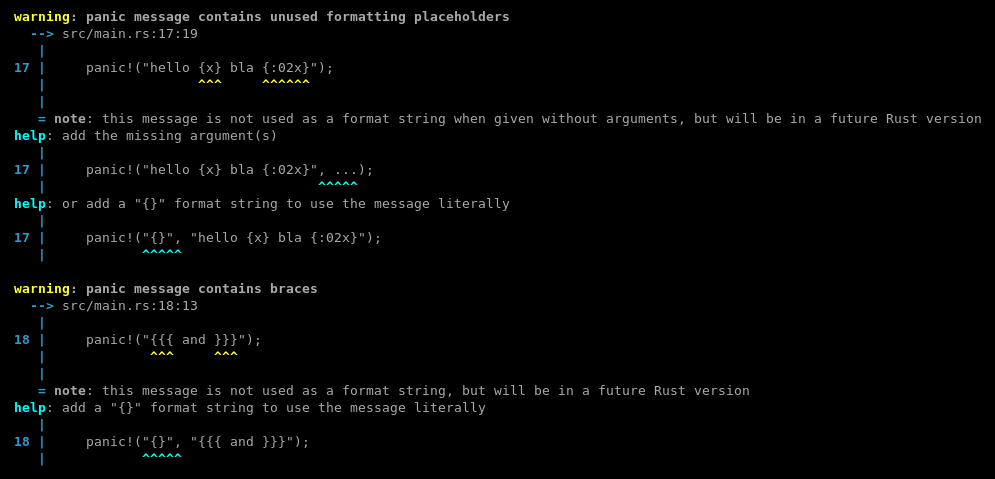When token-based attribute handling is implemeneted in #80689,
we will need to access tokens from `HasAttrs` (to perform
cfg-stripping), and we will to access attributes from `HasTokens` (to
construct a `PreexpTokenStream`).
This PR merges the `HasAttrs` and `HasTokens` traits into a new
`AstLike` trait. The previous `HasAttrs` impls from `Vec<Attribute>` and `AttrVec`
are removed - they aren't attribute targets, so the impls never really
made sense.
Crate root is sufficiently different from `mod` items, at least at syntactic level.
Also remove customization point for "`mod` item or crate root" from AST visitors.
Along the way, we also implement a handful of diagnostics improvements
and fixes, particularly with respect to the special handling of `||` in
place of `|` and when there are leading verts in function params, which
don't allow top-level or-patterns anyway.
Fixes#81543
After we expand a macro, we try to parse the resulting tokens as a AST
node. This commit makes several improvements to how we handle spans when
an error occurs:
* Only ovewrite the original `Span` if it's a dummy span. This preserves
a more-specific span if one is available.
* Use `self.prev_token` instead of `self.token` when emitting an error
message after encountering EOF, since an EOF token always has a dummy
span
* Make `SourceMap::next_point` leave dummy spans unused. A dummy span
does not have a logical 'next point', since it's a zero-length span.
Re-using the span span preserves its 'dummy-ness' for other checks
cc #79813
This PR adds an allow-by-default future-compatibility lint
`SEMICOLON_IN_EXPRESSIONS_FROM_MACROS`. It fires when a trailing semicolon in a
macro body is ignored due to the macro being used in expression
position:
```rust
macro_rules! foo {
() => {
true; // WARN
}
}
fn main() {
let val = match true {
true => false,
_ => foo!()
};
}
```
The lint takes its level from the macro call site, and
can be allowed for a particular macro by adding
`#[allow(semicolon_in_expressions_from_macros)]`.
The lint is set to warn for all internal rustc crates (when being built
by a stage1 compiler). After the next beta bump, we can enable
the lint for the bootstrap compiler as well.
Make `-Z time-passes` less noisy
- Add the module name to `pre_AST_expansion_passes` and don't make it a
verbose event (since it normally doesn't take very long, and it's
emitted many times)
- Don't make the following rustdoc events verbose; they're emitted many times.
+ build_extern_trait_impl
+ build_local_trait_impl
+ build_primitive_trait_impl
+ get_auto_trait_impls
+ get_blanket_trait_impls
- Remove the `get_auto_trait_and_blanket_synthetic_impls` rustdoc event; it's wholly
covered by get_{auto,blanket}_trait_impls and not very useful.
I found this while working on https://github.com/rust-lang/rust/pull/81275 but it's independent of those changes.
- Add the module name to `pre_AST_expansion_passes` and don't make it a
verbose event (since it normally doesn't take very long, and it's
emitted many times)
- Don't make the following rustdoc events verbose; they're emitted many times.
+ build_extern_trait_impl
+ build_local_trait_impl
+ build_primitive_trait_impl
+ get_auto_trait_impls
+ get_blanket_trait_impls
- Remove `get_auto_trait_and_blanket_synthetic_impls`; it's wholly
covered by get_{auto,blanket}_trait_impls and not very useful.
Fixes#81007
Previously, we would fail to collect tokens in the proper place when
only builtin attributes were present. As a result, we would end up with
attribute tokens in the collected `TokenStream`, leading to duplication
when we attempted to prepend the attributes from the AST node.
We now explicitly track when token collection must be performed due to
nomterminal parsing.
Allow #[rustc_builtin_macro = "name"]
This adds the option of specifying the name of a builtin macro in the `#[rustc_builtin_macro]` attribute: `#[rustc_builtin_macro = "name"]`.
This makes it possible to have both `std::panic!` and `core::panic!` as a builtin macro, by using different builtin macro names for each. This is needed to implement the edition-specific behaviour of the panic macros of RFC 3007.
Also removes `SyntaxExtension::is_derive_copy`, as the macro name (e.g. `sym::Copy`) is now tracked and provides that information directly.
r? ``@petrochenkov``
This makes it possible to have both std::panic and core::panic as a
builtin macro, by using different builtin macro names for each.
Also removes SyntaxExtension::is_derive_copy, as the macro name (e.g.
sym::Copy) is now tracked and provides that information directly.
Fix some clippy lints
Happy to revert these if you think they're less readable, but personally I like them better now (especially the `else { if { ... } }` to `else if { ... }` change).
We now collect tokens for the underlying node wrapped by `StmtKind`
instead of storing tokens directly in `Stmt`.
`LazyTokenStream` now supports capturing a trailing semicolon after it
is initially constructed. This allows us to avoid refactoring statement
parsing to wrap the parsing of the semicolon in `parse_tokens`.
Attributes on item statements
(e.g. `fn foo() { #[bar] struct MyStruct; }`) are now treated as
item attributes, not statement attributes, which is consistent with how
we handle attributes on other kinds of statements. The feature-gating
code is adjusted so that proc-macro attributes are still allowed on item
statements on stable.
Two built-in macros (`#[global_allocator]` and `#[test]`) needed to be
adjusted to support being passed `Annotatable::Stmt`.
Add lint for panic!("{}")
This adds a lint that warns about `panic!("{}")`.
`panic!(msg)` invocations with a single argument use their argument as panic payload literally, without using it as a format string. The same holds for `assert!(expr, msg)`.
This lints checks if `msg` is a string literal (after expansion), and warns in case it contained braces. It suggests to insert `"{}", ` to use the message literally, or to add arguments to use it as a format string.

This lint is also a good starting point for adding warnings about `panic!(not_a_string)` later, once [`panic_any()`](https://github.com/rust-lang/rust/pull/74622) becomes a stable alternative.